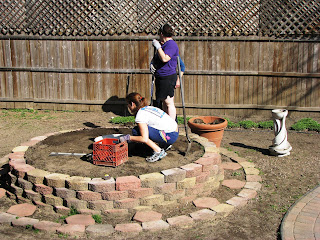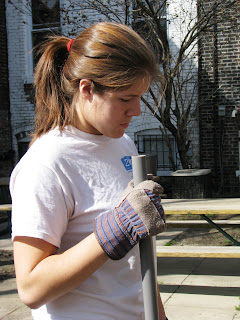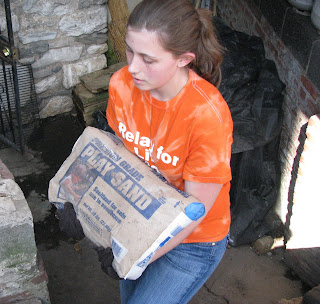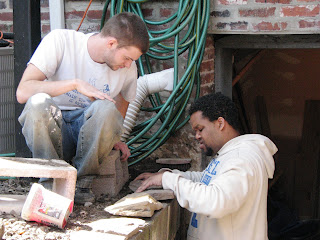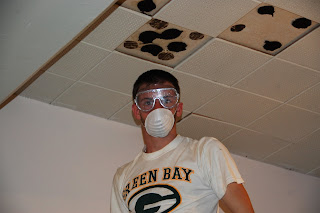And on the eighth day, they rested . . .
Work continued apace on the 7th day. What we had thought might be a day containing a huge hole of free-time for personal and touring time, turned into an almost manic time for nearly everyone to work projects to conclusion.
The pictures below demonstrate the "sweat equity" the Martha's Table crew put out.
Back at the church, yours truly was the church secretary for the morning, and in the afternoon the one who got to finish taking off the four pancake-looking old glue globs that used to hold each of the 60 or so missing ceiling tiles. Other jobs including brush clearing, and after-school kids interaction.
After work, we headed off to a West African cuisine restaurant in Adams Morgan. Travis challenged us to eat outside our comfort zone. We knew that it would be a different evening when James Whitt took a spoonful of very spicy soup, and had to evacuate the table in search of water. Fish, goat, manioc (cassava), stews, and spiced, dark rice were examples of some of our non-comfort food experiments.
The rest of the evening was free, for packing, or last-minute things. We were getting up at 5:00 on the 8th Day in order to avoid a major marathon closing off lots of Washington's streets, including 16th Street outside the church building.
That 5:00 call came, and we went, an uneventful drive "home".
I'll let others comment on the trip in the Comments section, what it meant to them. Here are the pictures (photographer unattributed at this time).
Sunday, March 21, 2010
Friday, March 19, 2010
Day Six
Church House & White House
As we move towards the end of our time here, the jobs we have for ourselves get more diverse, most of them small projects. The work at Martha's Table continues for one of our groups. The other group is now "groups." Work here at the church building included replacing ceiling tiles, making kits for visitors on Sunday mornings, re-painting lines in the parking lot, computer work and the regular interactions with the afternoon kids who come by.
As groups went through the day, we made sure we were in line at the White House security for our two scheduled tours, late morning, and afternoon. Neither fancy nor in-depth, once we got into the White House, ropes and very friendly guards guided us through long hallways on the ground floor, with peeks into various rooms. Once on the first floor, we went from the East to the West, and then out the front door. Next time, the West Wing. Next time, the living quarters!
Then back to work, with promises of a huge chunk of free time tomorrow if we work hard now. We really liked the taste of THAT carrot!
As we move towards the end of our time here, the jobs we have for ourselves get more diverse, most of them small projects. The work at Martha's Table continues for one of our groups. The other group is now "groups." Work here at the church building included replacing ceiling tiles, making kits for visitors on Sunday mornings, re-painting lines in the parking lot, computer work and the regular interactions with the afternoon kids who come by.
As groups went through the day, we made sure we were in line at the White House security for our two scheduled tours, late morning, and afternoon. Neither fancy nor in-depth, once we got into the White House, ropes and very friendly guards guided us through long hallways on the ground floor, with peeks into various rooms. Once on the first floor, we went from the East to the West, and then out the front door. Next time, the West Wing. Next time, the living quarters!
Then back to work, with promises of a huge chunk of free time tomorrow if we work hard now. We really liked the taste of THAT carrot!
Thursday, March 18, 2010
Day Five
Power and Powerless
After a morning of service in Miriam House’s garden and at S.O.M.E. (So Others May Eat), we met back at the church for the trip down to the Canon House Office Building. Room 433 houses the suite for former Redskins quarterback and now N.C. 11th District Congressman Heath Shuler. Unlike yesterday’s non-meeting with Senator Hagan, we had about 30 minutes with the Congressman. Our time together began with jokes and light conversation. Then the questions began.
It soon became obvious, in a conversation about the current healthcare reforms efforts, that the Congressman held a different vision than that of Senator Hagan. Health care is a right, but for the young, he said. After that, it is a privilege.
From then, to some of those gathered, he said either good words about the role of personal responsibility, or not-so-good words, so much re-varnished "Victims must be blamed." He had quite-ready explanations of his own voting record and positions on issues.
Yesterday's and today's meetings on Capitol Hill gave us good experiences in the halls of power. They were not exactly the visits to the sausage factory to witness how it's made, but we could smell it from where we sat.
The two meetings were in a kind of contrast, at least for this writer. I am reminded when I am in the offices of powerful people, that conversations can go two ways:
1. The person in the power seat is to be all mouth, and I am to have only ears. Those are the only two senses needed: brains and reason are checked at the door.
2. The person in the power seat, as do I, has all five senses intact, uncompromised; nothing is checked and there is a real dialogue.
One of Shuler's staffers then led us through the Capitol tour, easily one of the highlights for many people.
Back at the church, we ate dinner with Dr. David Hilfiker, author of the book we read in preparation for this trip. Now this was a conversation, a true dialog! Maybe it was because we are both raging introverts, or because I could sympathize with a country boy electing to come to the city at the call of his God, or maybe it was the issues we looked at in common ways ... Hilfiker entered into a true and perhaps life-changing exchange with us.
Some highlights from my notes:
- Most people who are middle class don’t know poor people, or if they do, they don’t know that they are poor. They think that the cause of poverty is the behavior of those who are poor (interesting contrast with Shuler).
- Be aware of the cultural judgments that children (or we) may hear, and find ways to bring a different reality to deflect these judgments. It is always good for us to be in a face-to-face relationship with people who are different from us.
- People who are poor are not all that different from you. They just have to deal with different worlds, ones in which violence and vulnerability are integrated.
- He talked a lot about the structural causes and enablers of poverty.
- One thing I am convinced of in the inner city is, if we did psychological testing, we would find psychological trauma or disorders in nearly everyone. PTSD, at least.
- I make a big distinction between optimism and hope. I don’t have a lot of faith in optimism. If we continue as we have for the last 40 years, there is ever optimism, but little chance for change. Hope is in the inter-personal exchange, where change happens. Hope is different. It is about relationships, doing important things, and that you are working on God’s side in the Kingdom.
Hilfiker mentioned one of my favorite places at night in Washington, DC, the FDR Memorial, sort of between the Lincoln and Jefferson Memorials. When he said it would be a great visit, the consensus to visit developed immediately. It was our last event of the day.
Subscribe to:
Comments (Atom)

